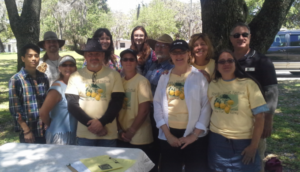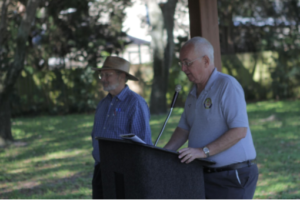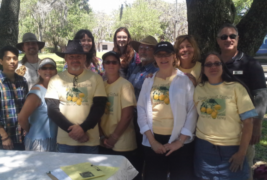Florida Loquat Festival News – No. 23
June 2017
Celebrating Florida’s Urban Fruit
An Ecology Florida/Friendship Farms & Fare Annual Event
Florida Loquat News
The Newsletter of The Florida Loquat Festival
No. 23
June 17, 2017
Celebrating Florida’s Urban Fruit
An Ecology Florida/Friendship Farms & Fare Annual Event
Here is Your Post-Festival issue of the Florida Loquat News
Florida Loquat Festival: Celebrating Florida’s Urban Fruit

Fourth Annual Loquat Festival Great Success
Large Attendance
Education, Economic, and Cultural Impact Significant
The fourth annual Florida Loquat Festival was a great success. Estimates are that 600 to 800 persons attended the April 8 event, and judging from sales, that number seems accurate. Over 600 jars of preserves were sold, well over 100 saplings were sold, festival t-shirts sold out of most sizes, and Jim Kovaleski sold out of his famous loquat cookies less than an hour after the festival began. The 100 commemorative brochures went fast, likely because they were presumed to be complementary – which they were in the general spirit of the festival, although organizers were welcoming contributions.
The educational program was very well attended and the poetry festival featured a number of cutting-edge creations from students from USF’s MFA program in literature.
The one missing piece of the festival was fresh loquats. There were few to be had, and certainly some disappointment. There is no apology for this. As a seasonal fruit festival, based on regionally available production, the festival relies solely on what is grown in and near the Springs Coast Watershed – and this year by early April, there was little fruit remaining on our local trees. Later in this edition, will be further details on this year’s loquat harvest.
This year’s festival featured addresses and lectures by the mayor of New Port Richey, Rob Marlow; local urban homesteader, Jim Kovaleski; local grower and cottage industry specialist, Sue Andreski; Jake Pieterse from Habitat for Humanity; Anne Short from New Port Richey FarmNet; and Dell deChant from the Department of Religious Studies at USF. Several sponsors of the festival also shared words of appreciation and support, including: Jon Labossiere from Premier Supporter, Suncoast Credit Union; Cindy Ewald from Major Supporter, the New Port Richey Rotary Club; and dedicated supporters Frank Starkey of People Places, and Jeff Wright of Wright’s Natural Market. Also supporting but not presenting, were Major Supporter, the Hook Law Group (Joan Nelson Hook) and S.I. Electric (Judy Nicita). Besides his address, the mayor read a proclamation from the city declaring April 8, Loquat Day in the city. We had a number of folks from outside the area join us, with confirmed visitors from Gainesville, Tallahassee, Sarasota, Brooksville, Tampa, Gulfport, and St. Petersburg. Recent immigrants from South Asia, Central Asia, and Europe also attended.
All in all, the festival was a great success, and organizers are already at work planning next year’s festival – March 24, 2018 (9:00 a.m. to 2:00 p.m.). Mark your calendars, and as we always remind: come early for best selection.
Subscribe to Loquat News and Tell a Friend
Go to the Ecology Florida website to sign up for Loquat News. If you know of others who might like to learn more about the loquat and our festival, send them the link.
We publish Loquat News periodically – 6-8 times a year. The News has updates on the festival and the seasonal progression of the trees. We like to share reports from folks who are nurturing trees on their property. From time to time we’ll feature growers, grove curators, nurseries, and preserve producers. You might see an editorial from time to time, and even a little whimsy.
Here’s how to reach us and enter a subscription:
http://www.ecologyflorida.org/contact-ecology-florida/
Thanks To Supporters and Volunteers
Every year, we are so thankful for the support of the community and the many businesses in the area who participate. This year is no exception We could not do the festival without this support. In this spirit, we are happy to share sincerest thanks with these groups and individuals (with note of their role in the festival):
Ecology Florida – Co-Founder and Sponsor
Friendship Farms & Fare – Co-Founder and Sponsor
Suncoast Credit Union – Premier Supporter
The Hook Law Group – Major Supporter
The Rotary Club of New Port Richey – Major Supporter
People Places – Contributing Supporter
S.I. Electric – Contributing Supporter
Wright’s Natural Market – Contributing Supporter
ALSO
deChant Public Relations – Media Relations
NewsPortRichey – Promoter
The Nature Coaster – Promoter
Rock the Boat Productions – Promoter
Green Dreams – Featured Nursery
Creative Institute of Dental Arts – Material Donor
Black Cat Growers – Featured Cottage Industry and Participant
Buttercup Kitchens – Cottage Industry Participant
Rose’s Bistro – Formative Contributor and Original Host
Habitat for Humanity – Material Donor
Coastal Rental – Material Donor
Sun Print Management – Material Donor
City of New Port Richey – Municipal Host and Resolution Provider
New Port Richey Public Library – Friend of the Loquat
Grand Gardens – Featured Harvesters
East Madison Growers – Featured Harvesters
Sylvia Spencer – Friend of the Loquat and Organizer
Joan Nelson Hook – Friend of the Loquat
Ryan Cheng – Friend of the Loquat and poetry curator
Jon Tietz – Friend of the Loquat
Jake Pieterese – Friend of the Loquat and volunteer
Pete Kanaris – Friend of the Loquat
Roy Kaplan – Friend of the Loquat and spoken-word performer
Barbara Klepper – Friend of Loquat and harvester
Sue Andreski – Friend of the Loquat
Frank Starkey – Friend of the Loquat
Reggie Gauvin – Friend of the Loquat, harvester, and volunteer
Amelia Maseda – Friend of the Loquat, harvester, and volunteer
Deb Jimenez – Friend of the Loquat, harvester, and volunteer
Audrey Voss – Friend of the Loquat and volunteer
Jeff Wright – Friend of the Loquat
Amber Blais – Friend of the Loquat and volunteer
Jim Kovaleski – Friend of the Loquat and Presenter
Judy Nicita – Friend of the Loquat
Rose Mohr and Jerry Kuss – Friends of the Loquat
Gary and Paula Gann – Friends of the Loquat
Don and Cindy Cadle – Friends of the Loquat and Harvest Donors
Dell and Marilynn deChant – Friends of the Loquat and volunteers
And many others.
Loquat Archives
We are compiling a booklet with archival articles on the loquat in Florida. The booklet will contain the two articles recently discovered by our researchers – Isabelle Krome’s 1936 article, “Louqats,” and John Popenone’s 1960 article “Evaluation of Loquats.” We have releases on these articles.
We are also seeking release from Winthrop Packard’s reflection on loquats in his famous 1910 book, Florida Trails. As an additional feature, we are including Dell deChant’s essay, “The Loquat’s Cultural Context.”
We expect the booklet to be available later this year, with a suggested donation of $10.00. Let us know if you’d be interested.
So What Happened To This Year’s Harvest?
So, what happened to this year’s harvest? The short answer has three parts: it was early, very heavy, and by festival day it was almost entirely in.
As noted above, as a seasonal fruit festival, based on regionally available production, the festival relies solely on what is grown in and near the Springs Coast Watershed. As a true celebration of local fruit, the festival is embedded in the very ecology of the region, and this year the harvest season came very early. Without intending to editorialize (or not much), the consequences of climate change directly impacted this year’s fruiting cycle. The hot, dry winter led to early fruiting throughout the region, and likely contributed to the very high yields reported by harvest teams. All told, the local harvest for the festival was close to 1,000 pounds. Unlike previous years, however, almost the entire harvest was in by mid-March, which is usually the peak (not the close) of the fruiting cycle. As a result, there was a large harvest, but it was very early. This resulted in a large quantity of preserves, but very little fresh fruit for the festival.
Next Year: Already?
Yes!
The Florida Loquat Festival’s 5th Anniversary
Opportunity to Participate
We are already planning next year’s festival, with a tentative date of March 24, 2018 (9:00 a.m. to 2:00 p.m.), Frances Avenue Park, New Port Richey Florida. The program will be 10:00 a.m. to 2:00 p.m.
There are some new additions planned for 2018, and future editions of the News will give details.
If you would like to volunteer to assist with the event, please let us know as soon as possible.
Our greatest desire will be for volunteers to assist with harvesting the fruit – especially the week before the event. We also welcome folks who will donate the harvest of their trees.
We are also looking for folks to prepare and sell preserves. As many of you know, one of the traditions of the Loquat Festival is selling out of all the jellies, jams, compotes, canned halves and slices. That is a tradition we would like to bring to an end in 2018. Every year there are more preserves than the previous year, and every year all are sold before the festival is over – this year all 600 jars were sold long before the festival concluded!
Needless to say, this is a great way to supplement one’s income. In fact, for those who are diligent, a considerable amount of money can be made.
Commercial Potential of Loquats
We remain convinced that there are excellent business opportunities available for enterprising folks who want to develop commercial ventures using loquats. Our festival has shown us that there is a market for a wide range of loquat products – from fresh fruit during the season, trees year round, to pies and other pastries (including cookies!) – and of course, preserves of all varieties. Harvesters could also prosper during fruiting season, and growers and cultivators throughout the year.
Loquats may be just the answer for some of the many folks who are looking for more sustainable endeavors, or just meaningful work. There is no question that a market for loquats exists – the Florida Loquat Festival proves that. Equally clear is that as of now that market has hardly been developed. Let us know if you are planning to pursue the commercial potential of loquats. We’ll publicize your endeavors, and feature your project at next year’s festival.
Growers’ Update I
2016-2017 Season Report
If you are growing loquats, your harvest for the season was probably early this year. The harvest was also extremely heavy. That’s the case for the groves at Friendship Farms & Fare.
This is first year we have ever irrigated the trees, and our oldest trees date back two decades. This past season also saw the first occasion of our trees being stressed. The stress was caused by record-breaking heat, lack of rain, and low humidity from early fall through the spring harvest cycle. Loquats are very tough and resilient trees but climate change can be hard on them as well.
Here at Friendship Farms & Fare, we harvested our last loquats on April 7 – the earliest our harvest has ever closed. We have harvested as late as June, but not this year. We estimate 400 pounds from our grove. This is our highest yield, and most of the trees are still young.
Your results may differ, and we’d love to hear about your harvesting experience – and really anything related to your trees and their features.
All told, harvests associated with the Florida Loquat Festival 2017 summed to an estimated 1,000 pounds. Directors estimate that another 1,000 pounds could have been harvested if more harvesters were available.
Growers’ Update II
2017-2018 Season Report
Advance Notes for 2017-2018
The trees have their summer foliage now, and with the arrival of the rainy season they should do just fine without much irrigation. For archival purposes, we note that we do not irrigate our trees after they are established (about a year) – except during extreme droughts, which we had this past year. We also do not fertilize, although we know those who do. Our experience is that loquats thrive without extra water or fertilizer – this is part of what we find so appealing about Florida’s Urban Fruit.
What to look for in the next few months: new leaves mature, flowers, first fruitlings. By now, the new leaves put out in the early spring are beginning to mature. That’s the case for trees in our primary grove.
Looking ahead, growers should be alert to the first flowers – the signal of the commencement of the fruiting cycle.
Flowers may appear as early as this month (June). The earliest we’ve had flowers at Friendship Farms & Fare is June 20. So, be on the lookout for them anytime now. Once the flowering starts, it will continue throughout the summer and into the fall, which means significant fruiting will begin as early as late fall and continue through early spring – with a single tree often bearing fruit for two to three months.
The first fruitlings should appear a little more than a month after the first flowers. We’ve noted that development tends to vary, which we attribute to weather conditions. In our experience, above normal heat, lack of rain, and arid conditions (as we had in the 2016-2017 season) seem to accelerate maturation and quantity of fruit. In contrast, more rain, overcast conditions, and cooler temperatures slow maturation and quantity of fruit.
We will see what this year brings.
Seed Starts and Seedlings: wait two months. One of the more persistent questions we receive concerns germination of loquat seeds. In our experience, seeds from locally established varieties of loquat trees germinate in just about two months. Almost like clockwork, two months after planting the seed, the first tender shoot appears. Also, on the basis of our experience, trees grown from seed mature and produce true to their parent. Cultivars are another issue, and seeds from them may not germinate.
The main guidance given here is to give the seeds at least two months to germinate. To be sure, we suggest waiting three months. So many have reported being dissatisfied with their seeds not germinating, only to learn that they gave up weeks before germination would have occurred.
Update on “Spring Hill Giant”: Every harvest, we select seeds for starting at the nursery from the trees that produce abundant, large, and healthy fruit. This year, we selected seeds from a beautiful tree in Spring Hill. The variety was not identified, but we suspect it is a Gold Nugget or Bradenton – but it could also be a hybrid, as are many of the trees that flourish in the S. C. Watershed.
We are dubbing it “Spring Hill Giant.” We planted ten seeds in our seeding mix on March 27, 2017 and the first sprout appeared on May 29, 2017. See note, above, on the typical two-month germination period. Of the ten seeds planted, as of this issue (mid-June), seven have germinated and four already have their first leaves.

Support Opportunities Available
If you or your business would like to support next year’s festival, please let us know, and we’ll send you our supporter package. You can contact us through the Ecology Florida website. If you leave a phone number, we’ll give you a call.
http://www.ecologyflorida.org/contact-ecology-florida/
http://www.ecologyflorida.org/
Thank You
Your interest and support of loquats and the Florida Loquat Festival is appreciated. Thanks for being part of our mission to increase awareness, appreciation, and use of “Florida’s Urban Fruit.”
Please share this newsletter with others you know. For information on supporting our work, see the contact addresses and link earlier in the newsletter, and below.


Leave a Reply